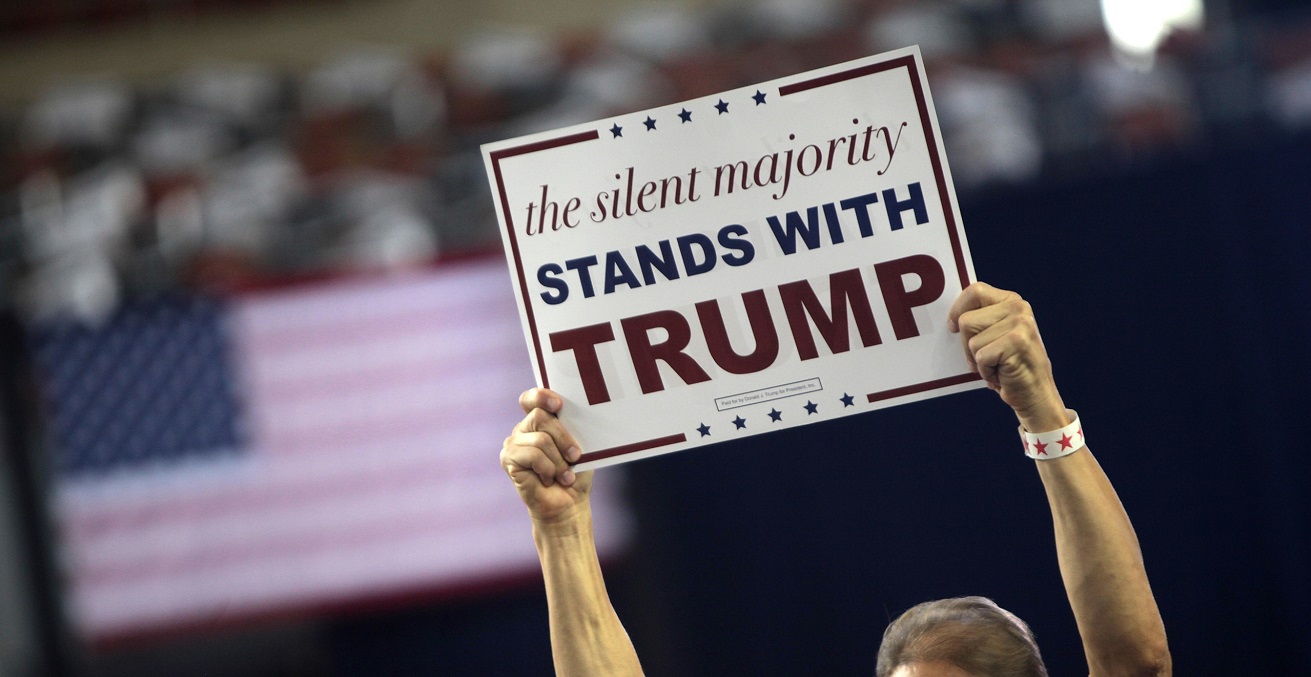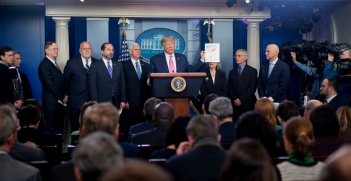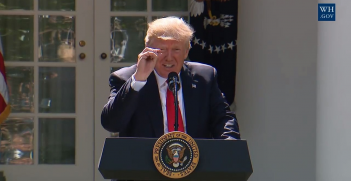Donald Trump Goes to Court: A Former President’s Legal Woes and the Future of American Democracy

On Wednesday, former president, front runner of the Republican primary, and business mogul Donald Trump turned 77. The day before, Trump was arraigned and charged with 37 felony counts related to his hoarding of national security documents.
These charges are part of a parcel being thrown at Trump this year. A New York jury found the former president liable for sexual abuse and defamation in the civil courts. Another civil trial in New York is set to begin in October looking at charges that Trump’s company deliberately misled tax authorities. Meanwhile, a second indictment has been carried out with arraignment expected in August for pressuring Georgia’s secretary of state, Brad Raffensperger, in 2020 to “find” an extra 11,780 votes and secure for him the presidency.
Given this onslaught, one might think it no wonder that 81 percent of Republican voters in a recent Reuters/Ipsos poll believe the current indictment politically motivated. Indeed, for many, any legal wrongdoing by Trump can be dismissed on these grounds alone. Of course, such sentiments dramatically underplay the seriousness of the allegations.
Trump is accused of the unlawful retention of classified information, obstruction of justice, refusing to return the documents to authorities, and false statements and representations. The 48-page indictment outlines the charges in careful detail. What should be the most damning of these is the ostensible carelessness displayed over the course of the past two and a half years in handling critical information. Trump shared, at least on two known occasions, “highly confidential” information to a writer, a publisher, and two members of his staff that includes a “plan of attack” prepared by senior members of the Department of Defense.
Other classified documents pulled from his residence at Mar-a-Lago include information on the defence and weapons capabilities of the US and other countries, national nuclear programs, US defence vulnerabilities, and other information that would likely risk national security and the safety of US military, government, and intelligence personnel.
At parts, the evidence produced by special counsel Jack Smith paints an almost comical picture of the former president’s actions. Top secret documents were kept in “a ballroom, a bathroom and shower, an office space, his bedroom, and a storage room,” the indictment explained, leading one newspaper to wryly state that Trump had been keeping America’s top nuclear files in the shower. Another description noted that boxes with “security clearance” documents were left for a time on a ballroom stage “where events and gatherings took place.”
What does all this mean for Donald Trump? If convicted on all accounts, the maximum sentencing guidelines reach into the neighbourhood of 400 years. For those more read into the understanding and procedures of the federal legal system, the classified documents case against Trump is close to iron clad. His extensive personal involvement in the alleged activities makes it incredibly difficult for Trump and his lawyers to pin the blame on others.
Former supporters who know better are looking to distance themselves, or at least “move on” from the Trump train. Former attorney general Bill Barr noted that “If even half of it is true, then he’s toast.” Chris Christie, a Republican primary candidate and former governor of New Jersey and federal prosecutor, told Anderson Cooper at a CNN town hall that the indictment was “very evidence laden,” calling Trump’s conduct “awful.” He also noted that the evidence was likely much more damning than what is known publicly. “When you’re a prosecutor,” Christie said, “you never put every card on the table before you go to trial.”
Down with democracy
Trump’s response to the arraignment on Tuesday included all the pomp of a rock star at a concert. There was a speech lambasting the “witch hunt,” an attack on the current president, Joe Biden, and his family, and an excoriation of the state of legal institutions in America and the “rigged” system of politics that exists in Washington. All of this was to the applause of thousands at the Miami federal courthouse and his cadre of supporters watching on tv at home.
What should have been a broader headshaking of an arraignment that had become a campaign rally was instead a fundraising call for Trump’s ongoing behaviour. CNN’s Jake Tapper asked the studio to stop filming, rightly concerned that the real issue of the legal charges would be delegitimised, along with America’s increasingly shaky political and institutional foundations. Fox News, by contrast, buried itself deeper into the conspiracy fantasyland by displaying a label on its broadcast calling Biden a dictator, pictured next to Trump. Brian Kilmeade, a conservative Fox News host, followed this up on Thursday by introducing Trump’s speech as coming from the “president of the United States.”
All this serves to illustrate how the boundaries of civility and decency have been overturned in American politics. Indeed, there is some truth to the claim that this began some time ago, and that what we are now witnessing is more of the same in the broader demise of American society. But most observers until now have been able to point to some guardrails in the political system that would hold important decision-makers accountable. These institutions – the courts, Congress, and the law enforcement agencies – are looking increasingly powerless.
The Republican Party meanwhile has accepted a state of affairs that views any action as permissible, so long as winning is the result and Republicans are doing it. Senator Chuck Grassley, for instance, considered that Trump’s charges should be subject to a broader court of public opinion. Presidential primary candidate and entrepreneur Vivek Ramaswamy, although more of an outlier among the other candidates, called for all Republicans to pledge to pardon for Trump if he is convicted.
Former vice president Mike Pence appeared for a moment to finally acknowledge that Trump’s actions were indefensible, but then hedged by concluding that “there must be another way” to deal with the issue. Pence has announced his bid for the White House, and he is likely to clash with his former boss in the primary.
Trump’s remarks on the indictment underscore the new depths of political polarisation that have accompanied the charges: “The seal is broken by what they’ve done,” he told supporters after his arraignment on Tuesday. “They should never have done this.”
Depending on how the Trump saga plays out, there will be one of two long-term lessons for future politicians. If Trump crashes in the primary and goes to jail as a result of the current indictments, the message will be unmistakeably clear: future presidential candidates will need to be politically beyond reproach. This will be a certain win for democracy, decency, and accountability.
If the charges fail and Trump wins the primary, the future of American democracy is likely to be much less guarded. Its politicians – a la Lauren Boebert and Marjorie Taylor Greene – are likely to be much more doctored in their partisanship and faithless in their dealings. An unleashed permissibility on the American right would see the destruction of modern American democracy. When talk of civil war has become much more acceptable, the time for reason and accountability has already passed. The next few weeks will be significant.
Dr Adam Bartley is a Fulbright Scholar and resident fellow at the Elliot School for International Affairs, the George Washington University. In addition to this, he is a post-doctoral fellow at the Royal Melbourne Institute of Technology and program manager of the AI Trilateral Experts Group. He is also managing editor for AIIA’s Australian Outlook. Twitter: @AaBartley
This article is published under a Creative Commons License and may be republished with attribution.





